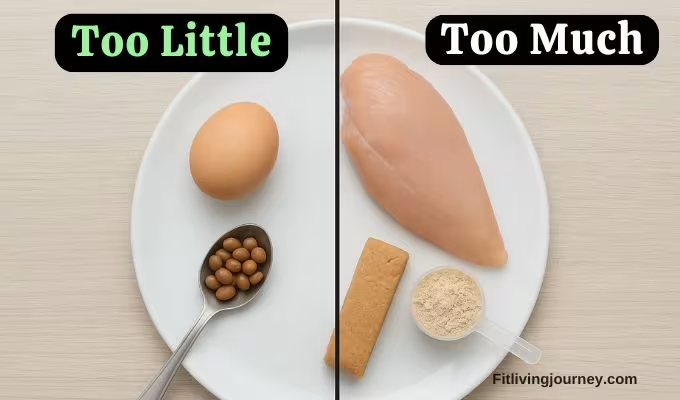How Much Protein Is Too Much
Protein plays a vital role in a healthy diet and is actually the key component to weight loss.
While it is undeniably essential for building and maintaining lean muscle, supporting the immune system, and promoting overall health and fullness throughout the day, there is only so much protein the body can process.
Overeating anything — including protein — can be detrimental.
The benefits we get from protein, especially for weight loss, depend greatly on the type of protein we choose.
So understanding the right amount and source of protein is essential for achieving balanced nutrition.
Can Too Much Protein Be Harmful?
Yes, excessive protein intake — especially beyond the body’s needs — may not give additional benefits and could cause potential drawbacks.
Research shows that very high protein intake doesn’t offer added advantages and could lead to health concerns.
Protein Needs Vary From Person to Person
Every body is different, so every body requires a different amount of protein. Some people need more, some less. So, what happens if you eat too much?
1. Protein Overload Can Stress Your Kidneys
Too much protein can place undue strain on your kidneys.
This becomes a bigger concern for those who already have kidney-related issues.
If you have such conditions, it’s important to take your protein goal to your doctor and ensure it works for your health status.
Even if your kidneys function well, eating too much protein forces them to work harder to eliminate the extra waste.
Over time, this extra workload may cause damage, especially in people with diabetes or high blood pressure.
This concern increases when protein supplements like bars, shakes, powders, and waters are overused.
Always consult your doctor before using them, particularly if you have kidney concerns.
2. The Body Only Uses a Limited Amount Per Meal
Our body typically processes 30–35 grams of protein per meal.
Any excess above that does not contribute to muscle building and is instead expelled as waste or used for energy.
You won’t gain weight just from excess protein per meal — weight gain only happens in a calorie surplus — but eating too much in one sitting isn’t helpful.
That’s why it’s important to spread protein intake across 4 to 5 meals throughout the day for better absorption and muscle support.
Include protein with every meal and snack to gradually meet your daily goal. Don’t load it all into one meal.

3. Too Much Protein Can Crowd Out Other Nutrients
Focusing only on protein can leave out other essential nutrients like carbohydrates and healthy fats.
For a balanced diet, protein, fats, and carbs must work together.
Neglecting this balance can hurt overall health.
4. Digestive Distress from Excess Protein
A high-protein diet can upset your gut and cause constipation, as protein is harder to digest.
It’s the macronutrient that takes the longest to break down and uses the most energy — helpful for weight loss but rough on the digestive system if overdone.
Smart Tips for Better Protein Absorption
- Increase fiber intake to 30–40 grams daily to support digestion.
- Drink more water to help with waste elimination.
- Take a daily probiotic — it works with the prebiotics in food to balance gut health.
- Fiber supplements may also help.
Factors That Determine Your Protein Needs
- Nutrient balance: Measure protein in grams — for example, 30 grams — for accuracy.
- Quality vs. quantity: The source matters as much as the amount.
Meats, fish, dairy, legumes, eggs, and nuts offer added nutritional value.
- Individual variation: Your age, weight, and activity level determine how much you need.
- Timing: Spreading protein evenly during the day supports better muscle recovery and growth.
Muscle and Metabolism Go Hand in Hand
The more lean muscle you have, the more calories you burn at rest.
Maintaining and building lean muscle is especially important with age and should be supported through strength training and exercise.
Whole Food First, Then Supplements
Focus on whole, real food for 80–90% of your daily protein.
Use 1–2 supplements daily only if needed.
These include protein shakes, powders, bars, and waters.
Avoid relying on online calculators for your daily protein target — they’re often inaccurate.
Each one gives a different answer. Instead, invest in understanding your own body’s needs.
FAQs: Protein and Your Daily Needs
Q1. How much protein should I eat per meal?
Ans. Most bodies can process 30–35 grams per meal. More than that is often used for energy or discarded as waste.
Q2. Can too much protein hurt my kidneys?
Ans. Yes, excessive protein can strain the kidneys, especially in people with diabetes, high blood pressure, or existing kidney problems.
Q3. Should I eat protein with every meal?
Ans. Yes, including protein in every meal and snack helps your body use it effectively and supports muscle maintenance.
Q4. Does a high-protein diet cause constipation?
Ans. Yes, it can. Adding more fiber and water can reduce digestive distress linked to high protein intake.
Q5. What’s better: food or supplements for protein?
Ans. Whole, real food is best. Use supplements only to fill nutritional gaps — not as your main protein source.
3 Powerful Home Remedies to Correct Navel Alignment


